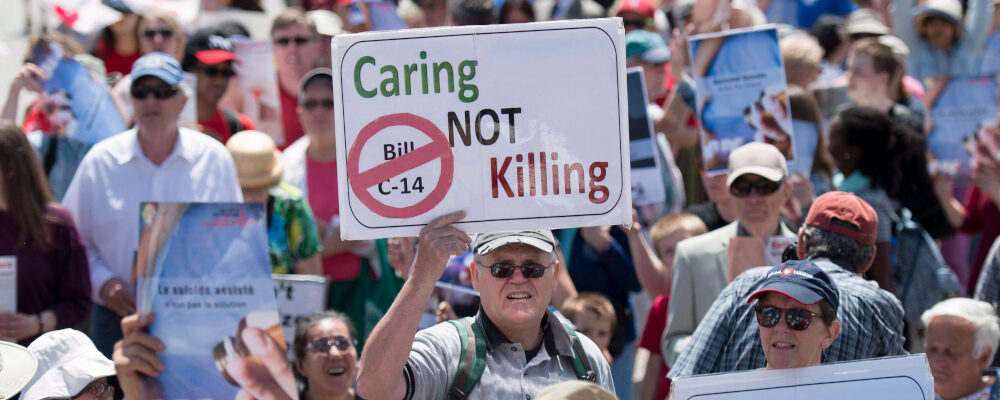Canada’s legalization of assisted death in 2016 has set off one of the most contentious debates in Canadian society. With the federal government pushing to expand the eligibility of those with access to medical assistance in dying (MAiD) to those suffering from mental illnesses or even potentially minors, that debate has only intensified. Today, we are pleased to present two young leaders from the Canada Strong and Free Network’s Conservative Values Tomorrow mentorship program who are taking on this topic for The Hub in a debate-style format.
Noah Jarvis argues we should be focusing our efforts on treating and comforting the vulnerable instead of killing them, while Jonah Davids believes that if we truly are committed to protecting individual freedoms, this necessitates allowing people to access MAiD even if it makes us uncomfortable.
We should help treat the vulnerable, not kill them
By Noah Jarvis
In Canada, we are supposed to appreciate the value of every individual’s life and help those unable to see the value in their own lives to see said value. We set up suicide hotlines to help people who are on the brink of killing themselves. We tell the tragic stories of people, like Amanda Todd, who have killed themselves so that we can confront the sad reality of suicide and what leads to it. However, the expansion of medical assistance in dying (MAiD) in Canada represents a sharp departure from cherishing each individual’s life. Instead, it normalizes suicide as a socially valid option.
Canadians suffering from mental illness and/or physical disabilities will soon be able to apply for and receive MAiD, a departure from the previous requirement that the patient had to be suffering from a condition that makes their death reasonably foreseeable.
The lives of Canadians battling disabilities and mental illnesses are no less valuable than those with able bodies and sound minds. Yet, instead of helping these people live fulfilling lives despite their ailments, we are euthanizing them.
Suicidal ideation is an error in thinking that often comes from an ill mind with a warped perception of reality. For people that are in constant pain as a result of terminal cancer, it may, in fact, be within that person’s self-interest to end their suffering. But for people suffering from a condition like depression, where one of the symptoms is suicidal ideation, a person’s ability to act within their self-interest is compromised.
If we wish to preserve a free society in which citizens are provided with maximum freedom, we must restrict behaviours with harmful community effects. While the argument for expanding MAiD is often framed as solely an individual decision where the harm is restricted to the person dying, this offers an incomplete picture. Suicides have community effects that are damaging to the social fabric. Anyone who knows a person who commits suicide, from close family, friends, or co-workers, can face a great deal of emotional pain as a result of the suicide. Suicide-exposed persons are far more likely to have diagnosable depression, anxiety, and PTSD and are more likely to have suicidal thoughts of their own in comparison to those who aren’t exposed to suicide. Even if one doesn’t personally know the person who committed suicide, members of the community will still reflect upon and be affected by the death.
Finally, in a country like Canada, where access to health-care services is plagued by chronic under-supply, we would be wise to ensure that our system does not incentivize killing off the mentally ill and disabled. Instances of Canadian veterans being offered MAiD are a troubling sign that we are already headed in this direction.
As a society, we are morally obligated to look out for and help the vulnerable. Canadians should find it appalling that the government would be facilitating the suicide of people suffering from treatable conditions, creating a hierarchy in the value of human life. MAiD for the mentally ill and the disabled is not a sign of a free society. It is a sign of a disordered one.
Jonah Davids’ rebuttal:
In arguing against the expansion of MAiD, Noah says that we should value every individual’s life equally, avoid normalizing suicidal choices, take care of the vulnerable among us, and restrict behaviour with harmful community effects, even if this requires limiting personal freedoms. He and other conservatives seem unable to recognize that this is the same logic used to justify COVID-19 mask and vaccine mandates. In both cases, government officials decide which medical choices we can and can’t make in the name of health, safety, and the common good. I say we let people decide for themselves.
Noah concedes that it may be within the self-interest of terminally ill patients to seek MAiD because they are in constant pain which cannot be treated. But he ignores the fact that many people with disabilities and mental illnesses have conditions that cause them constant psychological pain for which treatments are ineffective. Once this is granted, it becomes unreasonable to restrict MAiD to only those with terminal conditions. Perhaps the government should do more to help these people live rich and fulfilling lives, but that’s a separate issue from whether they should be able to access MAiD if they want to.
MAiD expansion will not create a hierarchy of human life in which the sick, disabled, and mentally ill are second-class citizens. The Netherlands and Belgium have euthanasia access for people with mental illnesses and disabilities, and both are egalitarian liberal democracies that safeguard their citizens’ rights and freedoms better than most countries. Not expanding MAiD, however, will propagate a hierarchy of autonomy in which the disabled and mentally ill are at the bottom. The introduction and expansion of MAiD complement, rather than undermine, Canada’s commitment to freedom, autonomy, and dignity for all individuals.

Freedom matters most
By Jonah Davids
One of the most important foundational principles that unites Canadian conservatives is our love of freedom. We fight for freedom of speech, the freedom to spend our money as we see fit, and the freedom to make our own medical decisions. We advocate for the freedom of others to hold beliefs or take actions that we disagree with, as long as they respect our right to do the same. This is the essence of what it means to be a conservative.
Some of my conservative friends have not gotten vaccinated for COVID. While I personally made a different decision, I wholeheartedly support their right to make such a choice. I want to live in a society in which individuals are free to make their own medical decisions, not one in which the government coerces people into doing what they think is best. People won’t make the best choices for themselves every time, but they should still be free to choose.
As a conservative who strongly believes in freedom, including medical freedom, I am disappointed by the opposition many on the Right have expressed toward MAiD. MAiD allows those with serious and incurable illnesses, diseases, or disabilities to end their lives. As a policy, it upholds individual liberty, prevents unnecessary suffering, and has the potential to save millions of dollars in health-care costs that would otherwise go toward providing care that people would rather not have.
Much of the conservative opposition to MAiD is fueled by partisanship, but that doesn’t mean we should ignore critics’ concerns. Those who oppose MAiD are worried that people who could lead fulfilling lives are ending theirs prematurely; that mentally ill individuals and minors may be unable to consent to the procedure; that some may be choosing assisted death over poverty and homelessness; that MAiD is being offered too readily by government workers to suffering individuals. Above all, they are worried that MAiD is a slippery slope, and that the eventual response to any serious suffering will be, “Have you thought about MAiD?”
These concerns are understandable, but the available data we have from Canada and other countries with similar policies show these fears are largely unfounded. Canada’s own statistics show that very few young people have accessed MAiD since its introduction: in 2021, the average age of those who received assisted death was 76, and only 1 percent of those who received it were between the ages of 18 to 45. In the Netherlands and Belgium, which have had euthanasia policies since 2002, the number of minors who receive assisted death each year is in the low single digits. The Canadian government’s own expert panel has written that mental disorders are “highly unlikely” to be deemed incurable before a person reaches the age of 18 or 19, which means that minors in all likeliness won’t be able to access MAiD solely for mental illness.
While it is unlikely that MAiD in Canada will lead to a dystopian nightmare, there will be cases that make many of us deeply uncomfortable. Should the government allow a 23-year-old suffering from blindness, depression, and diabetes to die by MAiD? What about a 54-year-old with crippling back pain who is facing homelessness? How will Canadians react to seeing a 40-year-old with debilitating bipolar disorder end his life via the procedure, or a 15-year-old with end-stage cancer? Such cases will be debated in the media and extrapolated to condemn what is by and large a system to help older Canadians suffering from terminal illnesses end their lives in a dignified manner. And yet, it is undeniable that there will be some individuals who make decisions we disagree with, object to, and may even be appalled by. What should we do?
The answer is that we should let them. We as conservatives believe in freedom. Freedom isn’t just the freedom to make easy, popular, and obviously good decisions, it’s also the freedom to make difficult, unpopular, and potentially tragic decisions as well, so long as the individuals making them are the ones to suffer the consequences.
Many conservatives fought to defend the freedom and autonomy of the unvaccinated and their right to make a medical decision many vehemently disagreed with. They ought to support the extension of those same rights and freedoms to those with incurable suffering who wish to end their lives, even if they don’t always agree with their reasons for doing so.
As conservatives, I hope we can rise above partisanship, set aside our own feelings about the medical decisions of others, and come together to support MAiD, a policy that promotes individual liberty and medical freedom.
Noah Jarvis’ rebuttal:
It is true that freedom is an important principle that has shaped the development of the Canada we know and love today. Conservatives ought to not only respect but also champion freedom. But we must ask the question: the freedom to what?
Certainly, we aren’t free to harm others and society at large. Suicide has serious societal ramifications, as I previously explained. And we certainly don’t have the positive right to government-provided assisted suicide services. That is not a right or freedom found in the Charter of Rights and Freedom, nor is it a moral imperative.
Edmund Burke once said: “The State ought to confine itself to what regards the State, or the creatures of the State…in a word, to everything that is truly and properly public, to the public peace, to the public safety, to the public order, to the public property.” It is within the Canadian public’s interest and the government’s purview to ensure the safety of its most vulnerable population and deter them from ending their own lives.
While Jonah makes a passionate appeal to freedom with which many conservatives may sympathize, his analysis fails to consider that there can be no freedom without order. There is a great difference between the MAiD program and Covid-19 vaccination policies that attempted to coerce unvaccinated citizens to get vaccinated against a virus that, by in large, does not kill healthy people under the age of 60.
There is no freedom in the Canadian government facilitating a euthanasia regime for those capable of living rewarding lives. Because there is no freedom to be enjoyed when you are dead.




